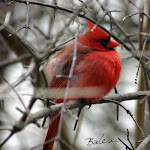•
The American kestrel is the smallest falcon native to the Americas. Weighing only four ounces, they are also the smallest raptor in our part of the world. They are generally found watching over meadows and other grasslands where they eat a wide range of prey animals including grasshoppers.
Dox, or Doc's, the kestrel pictured above, is a non-flighted male that was brought into the University of Tennessee Veterinary Hospital last January. He had a badly broken and infected right wing and sadly, will never fly again. He was treated by Dr. Cheryl Greenacre and it was the Doc's good care that brought him to me after he spent time on antibiotics with local wildlife rehabilitator Lynne McCoy.
 Dox is now a wildlife ambassador for the State of Tennessee under my care and state education permit. He makes routine public appearances to raise awareness of kestrels and their current status in the wild. The kestrel subspecies (Falco sparverius paulus) found in the American Southeast has suffered a population decline of 83 percent since 1940 and no one is completely sure why.
Dox is now a wildlife ambassador for the State of Tennessee under my care and state education permit. He makes routine public appearances to raise awareness of kestrels and their current status in the wild. The kestrel subspecies (Falco sparverius paulus) found in the American Southeast has suffered a population decline of 83 percent since 1940 and no one is completely sure why.Does Dox feel the pressure of representing kestrels everywhere? So far, he hasn't shown it.
He recently made two visits to Wild Birds Unlimited: 7240 Kingston Pike.
Thank you to all who stopped by for a "Meet & Greet." And thank you to Liz and Tony Cutrone for all you do for the local wild birds and the rest of the WBU staff for making us feel welcome.
And thank you to Vickie Henderson and Shirley Hamilton for the photos of Dox.
 |
| Tony and Liz Cutrone |
•





































































No comments:
Post a Comment